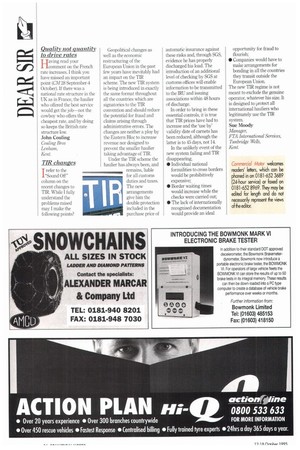Quality not quantity to drive rates
Page 36

If you've noticed an error in this article please click here to report it so we can fix it.
aving read your mment on the French rate increases, I think you have missed an important point (CM 28 September-4 October). If there was a national rate structure in the UK as in France, the haulier who offered the best service would get the job—not the cowboy who offers the cheapest rate, and by doing so keeps the British rate structure low.
John Couling Coaling Bros Lenham, Kent.
TIR changes T refer to the 1.“Sound Off" column on the recent changes to TIR. While I fully understand the problems raised may I make the following points? Geopolitical changes as well as the economic restructuring of the European Union in the past few years have inevitably had an impact on the TIR scheme. The new TIR system is being introduced in exactly the same format throughout all the countries which are signatories to the TIR convention and should reduce the potential for fraud and claims arising through administrative errors. The changes are neither a ploy by the Eastern Bloc to increase revenue nor designed to prevent the smaller haulier taking advantage of TIR.
Under the TIR scheme the haulier has always been, and remains, liable for all customs duties and taxes. The new arrangements give him the double protection included in the purchase price of
automatic insurance against these risks and, through SGS, evidence he has properly discharged his load. The introduction of an additional level of checking by SGS at customs offices will enable information to be transmitted to the IRU and issuing associations within 48 hours of discharge.
In order to bring in these essential controls, it is true that TIR prices have had to increase and the use by' validity date of carnets has been reduced, although the latter is to 45 days, not 14.
In the unlikely event of the new system failing and TIR disappearing, • Individual national formalities to cross borders would be prohibitively expensive; • Border waiting times would increase while the checks were carried out; • The lack of internationally recognised documentation would provide an ideal opportunity for fraud to flourish; • Companies would have to make arrangements for bonding in all the countries they transit outside the European Union.
The new TIR regime is not meant to exclude the genuine operator, whatever his size. It is designed to protect all international hauliers who legitimately use the TIR system.
Sue Moody Manager, FTA International Services, Tunbridge Wells, Kent.




















































































































